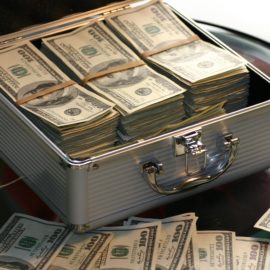

This article is an excerpt from the Shortform summary of "The Glass Castle" by Jeannette Walls. Shortform has the world's best summaries of books you should be reading.
Like this article? Sign up for a free trial here .
Are there examples of bad parenting in The Glass Castle? Does Jeannette Walls believe that her parents are good or bad parents?
There are several examples of bad parenting in The Glass Castle. Though Jeannette has a close relationship with both parents, she and her siblings all suffered from neglect and were nearly always hungry.
Read more about the examples of bad parenting in The Glass Castle, particularly how the Walls children dealt with food insecurity.
Bad Parenting in The Glass Castle: A Visit From Child Welfare
There are many examples of bad parenting in The Glass Castle. The Walls. parents were impoverished, and when they did have money, budgeted poorly in addition to not providing other basic needs for their children.
These examples of bad parenting in The Glass Castle show Jeannette and her siblings struggling with the consequences of their parents’ neglect.
One of the examples of bad parenting in The Glass Castle led to a visit from child welfare. Jeannette lied about her parents’ work. The child welfare man never came back, but his visit was enough to force Rose Mary back into teaching. She was hired immediately in an elementary school in Davey, a few miles north of Welch. She had to carpool with another teacher, an unpleasant woman named Lucy. Whenever Rose Mary got out of the car, Lucy sprayed Lysol on the passenger seat.
Rose Mary’s teaching performance was the same in Davey as it had been in Battle Mountain. She was lax about grading and discipline, and she had to be coerced to even go to school. Some mornings, she would hide in bed refusing to go like a child. The kids would drag her out and get her ready before Lucy became impatient and left her behind.
Despite her antics, Rose Mary was making money, and her paycheck was a blessing to the household. On payday, they’d cash the check and pay off the monthly bills. Rose Mary put space heaters and a refrigerator on layaway and paid a little each month. They’d stock up on groceries and have enough money left over to survive the rest of the month. But despite her good intentions, this is one of the examples of bad parenting in The Glass Castle.
But soon the food was gone, and so was the money Jeannette could never get a straight answer from Rose Mary about where the money went. She knew Rose Mary had to buy little gifts for herself, things she said made you feel rich, like crystal vases. But even accounting for those splurges, there should have been money left over. Jeannette and Lori came up with a budget and tried to persuade Rose Mary to let them handle the finances, but she refused. By the end of each month, Jeannette was back to digging in garbage cans for lunch.
Hunger
The only time there was food in the house was when Rex managed to make it home and Rose Mary received a check from the Texas land. The money she received was enough to stock the pantry for days to weeks at a time.
The family ate pinto beans day after day until they ran out. Sometimes they’d have popcorn for dinner if that was all the food left. When the checks were big enough, Rose Mary would buy a large canned ham, and they’d feast on thick slices. Because there was no refrigerator, the ham would spoil on the counter. One day, Jeannette went to cut a slice and found it infested with maggots. Rose Mary was eating a slice. She told Jeannette she shouldn’t be so picky and to just cut around the maggots. This is one of the most striking examples of bad parenting in The Glass Castle.
When the money ran out, they’d go without food for lengthy periods. Jeannette and Brian foraged whatever they could find, like fruit from trees, but it wasn’t enough. The children were so thin, the kids at school made fun of them. Jeannette hid in the bathroom at lunch and waited for girls to throw their lunch bags away. She rifled through the garbage, amazed at how much food other kids wasted, and took her spoils into the stall to eat. She was sure Brian was subsisting in the same way, but they never spoke of it.
On the contrary, Maureen was well fed. She had made a number of neighborhood friends and often wandered to their house for dinner. Somehow, Rose Mary seemed to be gaining weight.
One night, Rose Mary and the children were in the main room trying not to think about how hungry they were. Rose Mary was on the sofa bed and kept dipping below the blankets. When Brian caught her chewing, she said she was just moving her jaw around because her teeth hurt. Brian pulled back the blankets to find a family-sized chocolate bar half-eaten.
Rose Mary pleaded for forgiveness. She said she was addicted to sugar like Rex was addicted to alcohol. They always forgave Rex, so they should forgive her. Brian separated the remaining chocolate into equal pieces for the four kids, and they ate it in front of Rose Mary.

———End of Preview———
Like what you just read? Read the rest of the world's best summary of Jeannette Walls's "The Glass Castle" at Shortform .
Here's what you'll find in our full The Glass Castle summary :
- The author's unbelievable childhood as her absent parents went on alcoholic binges
- How Jeannette and her siblings escaped their parents to strike out on their own
- The complicated relationship Jeannette had with her parents before they died






